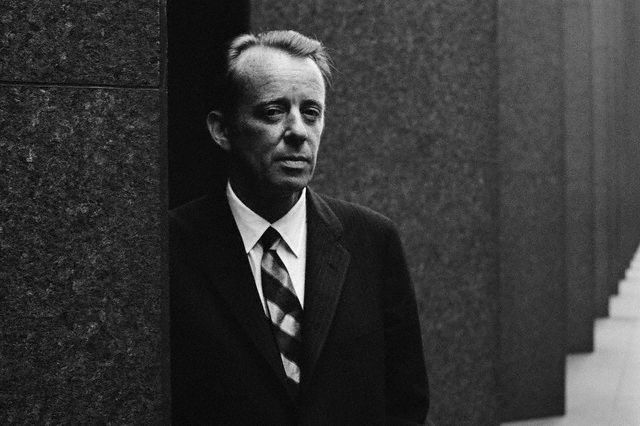Calder Willingham was an accomplished novelist, playwright, and screenwriter who created some of the most memorable characters in the American cinematic and literary canons. Characterized by raw sexual overtones, several of Willingham’s novels are set in the South, with Georgia providing the backdrop for two of his novels, Eternal Fire and Rambling Rose.
Born in Atlanta on December 23, 1922, Calder Baynard Willingham grew up in Rome. Upon graduating from high school, he enrolled briefly at the Citadel, a military college in Charleston, South Carolina. His experience there provided him with fodder for his first novel, End as a Man. After completing his education at the University of Virginia, Willingham moved north to New York City, where he associated with many of the era’s literary giants, including Truman Capote, Norman Mailer, and Gore Vidal.

Photograph from Corbis
When End as a Man appeared in 1947, Willingham established himself as a leading author in his own right. The novel presented a scathing and lurid assessment of the overblown machismo Willingham encountered at the Citadel. A reviewer for the Washington Post Book World, writing many years later in 1987, called the author “a dangerous sort of writer, mucking about with all sorts of taboos, his dark humor not always covering his tracks.” Obscenity charges were filed but later dropped against the book’s publisher, Vanguard Press, and in 1953, a theatrical adaptation of the novel enjoyed an off-Broadway success. Willingham wrote the screenplay for a 1957 film version of the work, entitled The Strange One, which marked the film debut of actor Ben Gazzara.
Willingham spent the next several years as a screenwriter, working with several prominent actors and producers and cowriting such films as Paths of Glory (1957) and One-Eyed Jacks (1961). Willingham and Buck Henry collaborated on the screenplay for The Graduate (1967), which they adapted from a novel by Charles Webb. The film, starring Dustin Hoffman and Anne Bancroft, became one of the most popular and acclaimed films of 1967, and critics continue to hold it in high esteem. The screenplay earned Henry and Willingham an Academy Award nomination for its fairly ruthless dissection of middle-class hypocrisy, materialism, and lifelessness.
Three years later, Willingham again earned accolades for his screen adaptation of the Thomas Berger novel Little Big Man (1970). Also starring Dustin Hoffman, this comedic drama turns the traditional “heroic” tale of the American West on its head by focusing on the apocryphal life and times of Jack Crabb, the lone white survivor of Custer’s last stand.
Over the next two decades, Willingham continued to write novels and adapt screenplays for television and Hollywood, although never with the same success he enjoyed with The Graduate and Little Big Man. In 1972 he published Rambling Rose, a semiautobiographical account of Willingham’s adolescence in Rome. The story revolves around the sexual tensions that emerge when a rural Georgia family hires Rose, an alluring housemaid from Birmingham, Alabama. In 1991 Willingham adapted the novel for film. Starring Laura Dern, Robert Duvall, and Diane Ladd, the film received lukewarm reviews but earned Academy Award nominations for both Dern and Ladd.
Despite his years as a screenwriter, Willingham did not see much value in his work for Hollywood and considered his calling to be that of a novelist. His other novels include Geraldine Bradshaw (1950), Reach to the Stars (1951), Natural Child (1952), To Eat a Peach (1955), Eternal Fire (1963), Providence Island (1969), The Big Nickel (1975), and The Building of Venus Four (1977). He also published a collection of stories and nonfiction, The Gates of Hell, in 1951. As a fiction writer, Willingham worked in a variety of genres, spanning conventional coming-of-age plots to science fiction to narratives about sex and family life. Eternal Fire, in particular, satirizes the tradition of Southern Gothic fiction.
On February 19, 1995, Willingham died of lung cancer in Laconia, New Hampshire. In 2006 the Writers Guilds of America, east and west, placed the script for The Graduate at number 13 on their list of the 101 greatest screenplays. He was inducted into the Georgia Writers Hall of Fame in 2008.



























